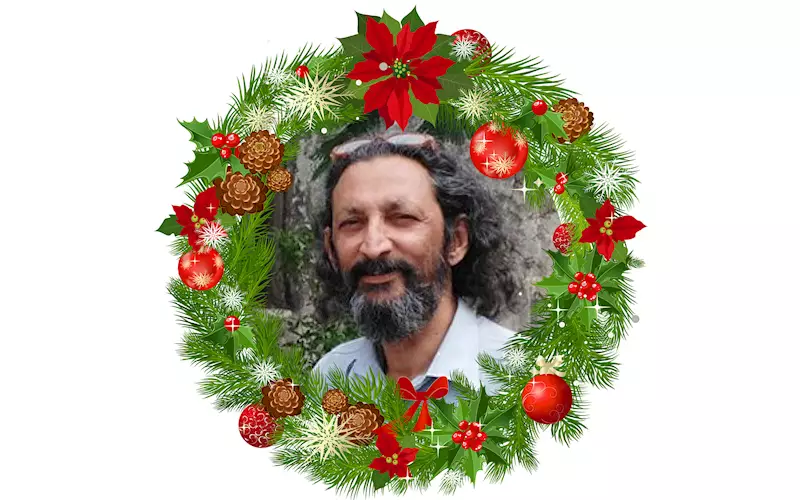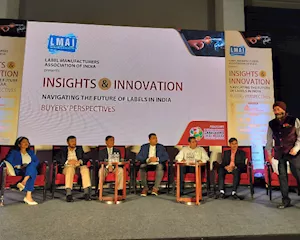Adieu Abhijit Pandit: The print priest of standardisation
Getting the ‘gray balance’ was a clarion cry of this linguist, outspoken and “mast maula” with clear print knowledge.
The death of Abhijit Pandit marks the passing of Indian print’s walking, talking print gyani. His death was met with profound sadness, and heartfelt tributes – A “hard core follower of Felix Brunner...” said one, while another called this fair- slim and trim person, a “bearded angel”.
The Indian print needed him for much longer, but solace can be found in the pr
22 Apr 2017 | By PrintWeek India
|
Ramu Ramanathan, PrintWeek India Abhijit Pandit passed away on 18 April in Nashik City. Social media was abuzz with his colleagues, students and admirers expressing "shock" at his untimely death due to a cardiac arrest. Abhijit Pandit was born in 1960 in Mumbai. By the time he was in his teens, he was apprenticing at his family-owned print shop plus learning German. In the early eighties, he had worked at a few other printing presses in and around Mumbai, and he realised his true calling: ink on paper. His forte was offset. He was my "go to man" for anything I needed to know about offset print. Thanks to his training at the Hauchler Studio, Biberach a.d. Riss he was exposed to the skillset which "only the Germans can provide" he said. Besides being hungry for knowledge, he was bright and had a high Mensa-type IQ. In 1987 he got a scholarship as a technical print master at JGS in Stuttgart. On cue he completed his REFA, ADA, Fachhochschulreife. He said, this is nothing, I have also done a 300 lpi job. When the prodigal son returned to Amuchi Mumbai, his family print shop became his R&D lab. And although, he was "officially production manager with 40 workers", what Pandit strove for was creating a viable Indian template for plant audits where "illiterate operators could test inks and test machines and produce German quality in Indian conditions". Even in the nineties, he was talking about creating a spreadsheet solution for quality analysis. But to most people this was gobbledygook. Most didn't understand his tech talk; and those who did preferred working with expat technicians. He was a tormented soul. He loathed mediocrity. He loathed the chalta hain attitude. He said, I have no talent for print life in this country, it seems. So he found solace in conducting seminars and workshops on quality and standardisation. At times these sessions were designed for DIC Inks and their handpicked customers. At times, it was training tutorials on the shopfloor of select printers. But I overheard him mention to someone, "People nod in the front row but I don't think they will implement any of these things." He enjoyed a long innings with Manugraph and later TechNova. He said both companies genuinely believed in one-to-one tech advice and mentoring sessions for customers. Otherwise everyone sought "free gyaan which they could ignore". At the turn of the century, Pandit shifted his focus onto pre-press. He mentioned, "A good printer should be comfortable with CTP, and its associated technologies. I don't say I am the one who can handle the various workflows, but I can certainly control the halftones and understand the applications." And he believed every master printer should know how to do this. He said like Arjun in the Mahabharata who had the bird's eye in his sights, his point remained "the same". I asked him, what was his goal? He replied, from the day we met first to now it has always been quality and standardisation of the print process, through proper and focused training of the manpower". This was Abhijit Pandit's forte, so to say. Abhijit had a troubled and chequered personal life but technically he was one of the sharpest persons on the shopfloor that I knew. He hated carelessness and negligence. "Our people are good. But the Germans are scientific, and print, ultimately is science. You have to master the rules. There are no shortcuts" The last time we met, he said, "It's a pity that all my qualification, education, experience and passion, could not create an equation - like a magic mantra - that could transform our industry into a better place." He had bagged two new assignments, "Times are certainly changing. Bob Dylan has won the Nobel; and I am becoming a noble soul." He added, later in the night, "I am single with no strings attached except for my "Halftone" dots or the "Rasterpunkte", I am free to move wherever life takes me." RIP Abhijit Pandit. May you create halftones in heaven. |
Nitin Wani, Smart Solutions
सांस गयी तो Abhijit, as I little understood him over last 25 years, was a linguist, outspoken and mast maula person with very distinctive print domain knowledge. He possibly lived his life all for himself, selflessly, helping (literally) everyone in need. I remember my first meeting with him, at his press way back in the 90s. A fair, slim and trim, bearded press owner was dirtying his hands on the press as he offered us a toast over discussions on eyeglass, test chart, and halftone dots. We were new engineers looking forward to gaining in-depth knowledge about print technologies, machines and test charts from this Germany-returned print gyani. We met several times exchanging thoughts and ideas, hearing out to him, going through his notes and his humongous collection of print related books and research papers, sharing concerns over print quality. Many times he surprised me by being a bearded angel to the needy and deprived kids and unattended domesticated animals. My friend, we will miss you and you will be remembered for everything special that you had and sharing your knowledge. Salute to Abhijit. All the best for his journey to the heavenly abode. The question that now remains unanswered is, can this gem of a person’s wealth of knowledge be restored in any form and be made available to the print fraternity? This time, not selflessly….. but acknowledging his passion and devotion to print media. |
|
Vijay Pareek, Genius Flexo Machinery
|
|
Hrishikesh Kulkarni, Royal Impex
|
|
Abhiram Sathe, Kodak
|
|
Abhay Kasture, TechNova Imaging Systems
|
|
Vinit Jadhav, Taco Visions
|
|
Prof Dr Rajendrakumar Anayath, The Technological Institute of Textile & Sciences
|
|
Franklin Joseph, Noble Printing Press
|
|
Suhaas Kulkarni, Solenis
|














 See All
See All